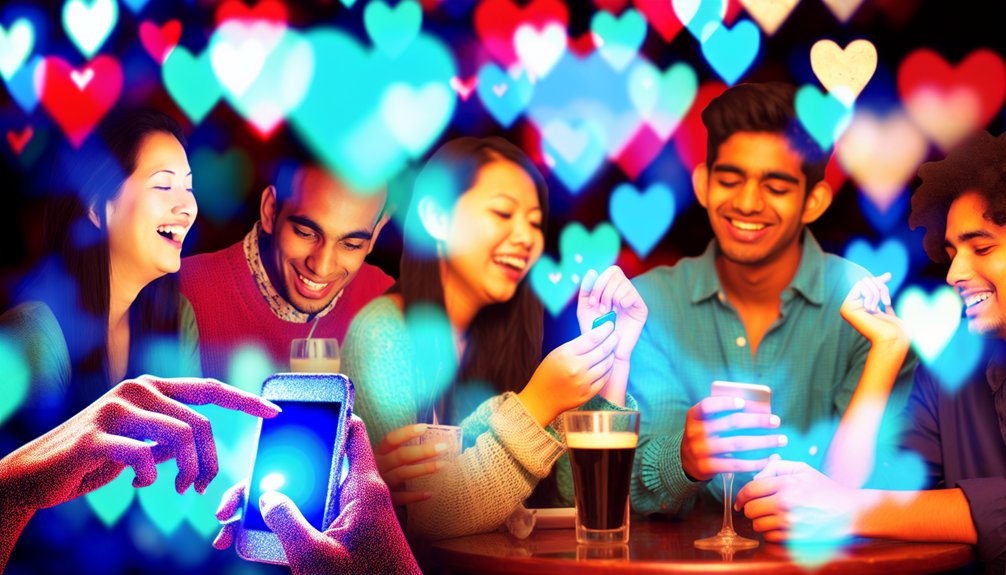
You’ve probably noticed how dating apps have transformed the way people connect today. With nearly 40% of U.S. couples meeting through these platforms, casual sex culture has gained a strong foothold. This shift raises questions about the implications for emotional intimacy and long-term relationships. What does this mean for your own dating experiences? Exploring the dynamics of this trend could reveal more than you expect.
The Impact of Dating Apps on Modern Relationships
As dating apps have surged in popularity, they’ve fundamentally reshaped how you connect with others in the modern relationship landscape. Nearly 40% of couples in the U.S. now meet through these platforms, highlighting a significant shift from traditional dating.
Particularly among adults aged 18-29, about 30% have embraced dating apps, reflecting their growing acceptance. However, this convenience comes with challenges. The paradox of choice often leads to anxiety and dissatisfaction, as you scroll through countless profiles.
Additionally, dating apps tend to prioritize physical attraction and instant gratification, which can sideline emotional connections and long-term compatibility. As you navigate this new terrain, understanding these dynamics is crucial for forming meaningful relationships in an increasingly digital world.
Understanding Casual Sex: A New Norm
With casual sex becoming a common aspect of modern dating, many young adults find themselves navigating this new norm.
Studies show about 50% of young adults have engaged in casual encounters, largely facilitated by dating apps that prioritize physical attraction and immediate desires. This shift reflects changing social norms, where personal exploration often takes precedence over traditional long-term commitments.
While many report feelings of empowerment and sexual freedom from casual sex, it can also lead to emotional complications. As acceptance grows, discussions about sexual health and safety become essential, prompting users to seek education on protection and consent.
Understanding these dynamics is crucial for anyone participating in this evolving dating landscape.
The Psychology Behind Hook-Up Culture
While many embrace the freedom that comes with hook-up culture, it’s essential to understand the psychological factors driving this trend. The rise of dating apps has reduced barriers to casual encounters, making it easier for you to explore your sexuality without the weight of commitment.
Studies show that nearly 70% of college students have participated in this culture, reflecting a shift in societal norms towards sexual liberation. However, prioritizing physical attraction over emotional intimacy can lead to feelings of disconnect and anxiety, especially if you crave deeper connections.
The focus on immediate gratification often overshadows the emotional complexities involved in these encounters, leaving you to navigate a landscape where pleasure and vulnerability coexist in a delicate balance.
Risks and Rewards of Casual Encounters
Engaging in casual encounters through dating apps offers both exciting rewards and potential risks that you should consider.
On one hand, these encounters can enhance your sexual freedom and exploration, with about 40% of users seeking casual sex as a primary goal. Many people report feeling empowered and more confident, with around 60% experiencing increased sexual satisfaction.
However, casual sex also comes with risks, such as a higher likelihood of contracting sexually transmitted infections (STIs). The emphasis on physical attraction can lead to superficial connections, and if expectations differ between partners, you might face emotional distress or regret.
Balancing the thrills and dangers is essential for navigating the landscape of casual encounters effectively.
Emotional Implications of Casual Relationships
Casual encounters can be thrilling, but they often come with emotional baggage that many overlook. You might find yourself feeling lonely or dissatisfied if you crave deeper connections.
Studies show that engaging in casual sex can increase anxiety and decrease your overall emotional well-being due to its fleeting nature. As you navigate these transient relationships, you may struggle with attachment issues, making it harder to form meaningful bonds.
Regret and emotional turmoil can arise as you confront the complexities of non-committed intimacy. The normalization of casual sex culture can also lower your expectations for emotional support, altering how you perceive romantic relationships and their emotional significance.
It’s essential to recognize these implications before diving in.
Navigating Consent in the Digital Age
How can you ensure that consent is clear and respected in the fast-paced world of dating apps? Start by establishing boundaries and expectations upfront.
With over 50% of users engaging in casual sex, it’s crucial to have open conversations about what you both want. Digital communication lacks non-verbal cues, so explicit agreement is essential.
Research shows that 71% of individuals prefer discussing consent directly before any sexual activity. Don’t leave room for ambiguity; clarify your intentions and desires to avoid misunderstandings.
The Role of Gender Dynamics in Casual Sex
Navigating consent in the world of dating apps reveals complex gender dynamics, particularly in casual sex culture. You’ll notice that men often show more openness to non-committed encounters, with about 65% preferring casual sex compared to 35% of women.
While women are increasingly partaking in casual sex, they face societal stigma and double standards, which complicates their choices between empowerment and judgment. Research indicates that men typically seek physical gratification, while women may look for emotional connections, even in casual settings.
However, dating apps are shifting these norms, giving women more agency to initiate relationships, which challenges traditional expectations. Communication styles also differ, with men focusing on physical traits and women prioritizing emotional compatibility, affecting interaction dynamics.
Long-term Relationships vs. Casual Connections
While many people embrace the thrill of casual connections through dating apps, the pursuit of long-term relationships presents a stark contrast that emphasizes emotional depth and compatibility.
Research shows that over 50% of app users engage in one-night stands or short-term flings, often prioritizing physical intimacy over emotional commitment. This trend, especially among younger individuals, can undermine the foundation required for lasting partnerships.
While casual connections might offer immediate gratification, they often lead to feelings of loneliness and dissatisfaction over time.
If you’re seeking a long-term relationship, you may struggle to find compatible partners in a landscape dominated by those primarily interested in casual dating.
The choice between fleeting encounters and meaningful connections ultimately shapes your relationship satisfaction.
Future Trends in Dating and Intimacy
As the landscape of dating continues to evolve, the interplay between casual encounters and the desire for deeper connections shapes future trends in intimacy.
You’ll notice that dating apps increasingly cater to casual interactions, aligning with the preferences of younger generations—about 70% of millennials and Gen Z are open to non-monogamous relationships.
This shift reflects a more liberal attitude towards sexual exploration, as nearly 50% of users engage in hookups. With nearly 40% reporting one-night stands, casual sex is now normalized.
Expect apps to enhance matching algorithms to prioritize non-committal interactions, allowing you to find partners who share your outlook.
As social norms continue to change, the future of dating will likely blend casual connections with opportunities for deeper intimacy.
Conclusion
In conclusion, dating apps have undeniably transformed the landscape of modern relationships, making casual sex more accessible than ever. While they offer exciting opportunities for exploration and connection, it’s crucial to navigate the emotional complexities that come with these encounters. As you engage in this new norm, stay mindful of your desires and boundaries. By understanding the potential risks and rewards, you can make informed choices that align with your relationship goals and emotional well-being.





